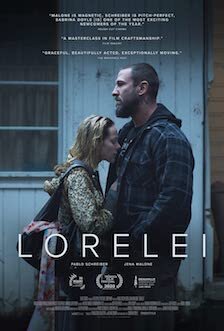Direction: Sabrina Doyle
Country: USA
From first-time writer-director Sabrina Doyle, a former BBC journalist, arrives Lorelei, a modest if perceptive family drama starred by Jena Malone and Pablo Schreiber. The film examines the meaning of family, the importance of a second opportunity in life, and the nerve needed to change at some point in order to keep us attuned to our wildest dreams. It’s a relatable, simple story set in a small town in rural America. Although it doesn’t really add anything fresh to the drama world, it retreads that ground with enjoyable spontaneity.
The plot centers on Wayland (Schreiber), a motorcycle club member who, after 15 years in prison for armed robbery, reconnects and moves in with his high school sweetheart, Dolores (Malone), a single mother of three.
The melodramatic mannerisms detected here and there are compensated with some fraught episodes in the life of a couple whose everyday struggle and willing to do better make you keep your fingers crossed for them. Wayland is refreshingly non-violent, caring and thoughtful, whereas Dolores is impulsive, moody and determined.
Fumblingly, Lorelei manages to escape predictability, with Doyle allowing everyone their dignity as she goes for an upbeat finale. Malone becomes the heart and soul of the film but the feelings are more intensely felt whenever the kids are involved.








































